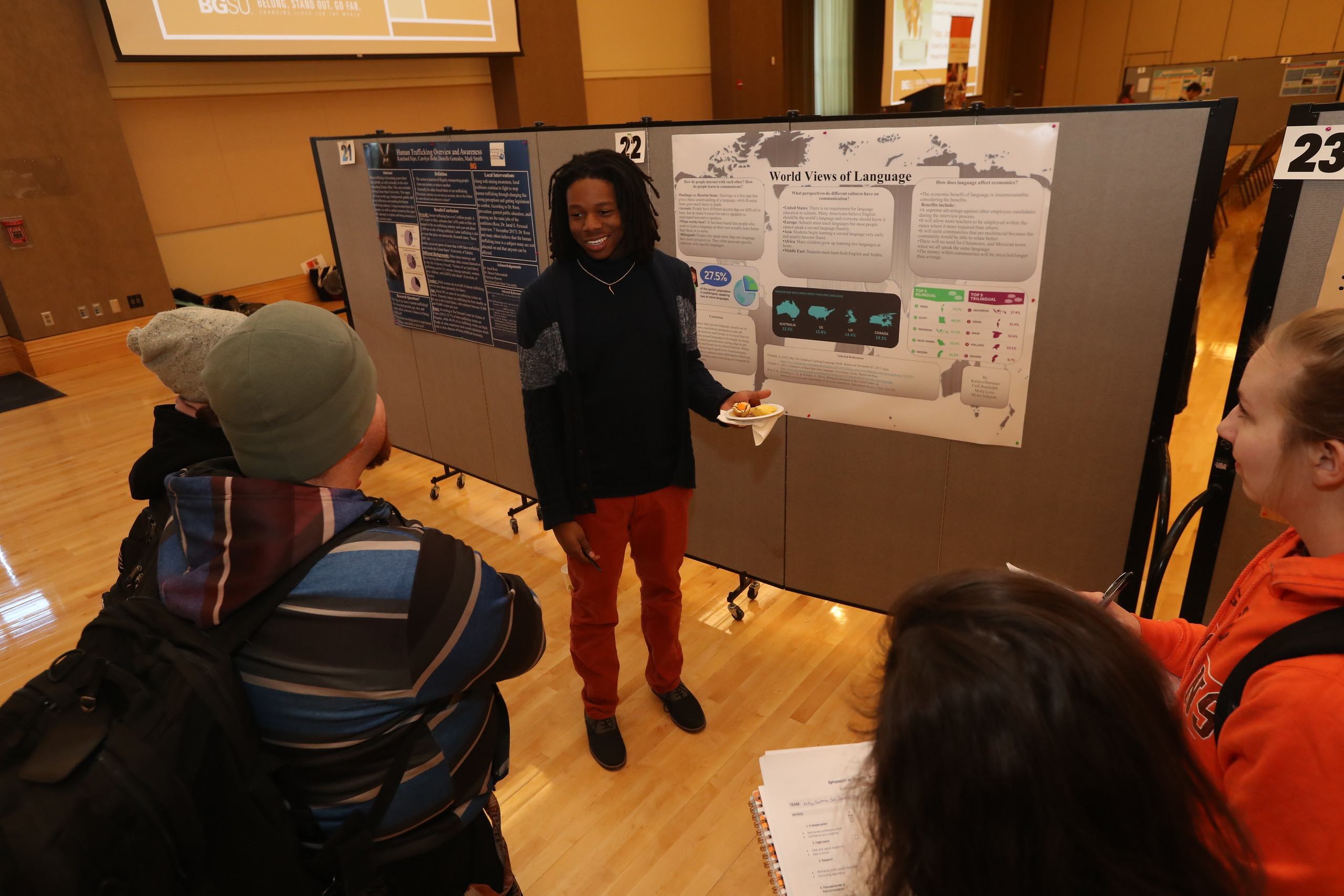Nationally recognized for student experience
The Wall Street Journal

Bachelor of Arts (B.A.)
Minor
Ethnic Studies
The BGSU ethnic studies program offers an interdisciplinary curriculum designed to foster an understanding of the histories and cultures of racial and ethnic groups in their local, national and global contexts.
The program provides an ethical and socially responsible area of study that encourages students to think critically about the world and their place within it.
Focusing on the institutions and political, economic and social processes that have staged race at the center of the nation’s histories, Ethnic Studies explores the significance of race in contemporary U.S. society.
The program emphasizes studies of race and ethnicity, gender and sexuality and the historical processes of slavery, colonial conquest, and immigration, among other subject areas.
The ethnic studies curriculum also embraces globalization and international migrations, so increasingly important to understanding domestic issues, international trade and the multiculturalism of modern America.
The BGSU Department of Ethnic Studies is one of the oldest programs in the nation focusing on interdisciplinary studies of race.
#1 public university in Ohio for career prep
The Wall Street Journal
Career - what can you do with an ethnic studies degree?
A major in Ethnic studies prepares students with the theoretical and conceptual tools to negotiate sensitively and successfully the complex global realities shaping our contemporary lives.
Graduates of the BGSU ethnic studies major will gain skills in navigating today’s drive for a more diverse workforce. Ethnic studies students develop a deep understanding of what is required to achieve diversity, equity and inclusion, the new touchstones of workplaces that are welcoming to all.
Former students have entered rewarding careers in human resources, law, education, advocacy, community organizing, international relations, government service, marketing and media productions.
Proven research skills, creative and critical thinking, and a well-rounded liberal arts education make lifelong learners that can contribute to any organization.
Career paths
- Corporate Consultant
- Journalist
- Community Advocate
- City Planner
- Human Resources Specialist
- Government Worker
- Diversity, Equity and Inclusion Consultant
- Marketing Coordinator
- Non-profit Administrator
- Educator
Quick Facts from the Bureau of Labor Statistics
Curriculum
The department of ethnic studies offers a major in ethnic studies, minors in ethnic studies and Latino/a studies, and a graduate certificate in ethnic studies.
As part of the School of Cultural and Critical Studies (CCS), all ETHN majors take a rigorous core curriculum in their junior and senior years that consists of a theory course (CCS 3030: Intersections of Gender, Race & Culture), a service-learning course (CCS 3710 Gender, Race & Culture in Community-Based Practice), a research methods course (CCS 4850: Qualitative Research Methods), and a writing course (CCS 4860: Capstone Seminar).
Taking the courses with other majors across CCS helps students develop a stronger sense of community and interdisciplinary connection. Ethnic studies minors are welcome to take these courses as well.
These interdisciplinary CCS courses are designed to bring together the diverse knowledge and skills students have acquired and prepare them for life after BGSU.
Students will learn cultural studies theories and qualitative and quantitative research methods, create their own research projects and engage in community service-learning. Ethnic studies majors are encouraged to pursue study abroad and internship opportunities.

Sample courses
- Africa and World Politics
- Latina/o Gender and Sexuality
- Race, Representation, and Culture
- Introduction to Native American Studies
- Women of Color in the United States
- Contemporary U.S. Immigration
- Ethnicity and Social Movements
- Intersections of Race, Gender, and Culture
#1 university in Ohio – big or small, public or private – students would choose again
The Wall Street Journal
Understanding cultural identity and difference
The BGSU ethnic studies program equips students with the skills for original inquiry into today’s life experiences of the intersectional populations of our communities.
While the core courses offered by the department speak to the intellectual roots of Ethnic Studies in the U.S. civil rights movement and student activism, our faculty also has strong expertise in globalization, immigration, diaspora and cultural studies.
Armed with a core of theory, critical thinking and advanced research and writing abilities, students exercise their skills to create a capstone project based on the critical analysis of primary and secondary sources.
The department has an active, ongoing community to support original research, with high-profile events. These are supported by a passionate and committed faculty and a student body that welcomes critical inquiry and advocacy to ensure BGSU embraces diversity by breaking down barriers to meaningful participation and that individuals are treated with dignity.
Student organizations
BGSU has several identity, cultural or political organizations expressly for students. They invigorate campus life and help push the agenda towards diversity, equity and inclusion for all on our campus and in our communities.
Finding Your Voice in Social Justice Learning Community
In the Finding Your Voice in Social Justice Learning Community, you will learn about activating social change from university and community leaders and organizers. We will introduce you to campus resources and help you foster connections with other students, faculty, BGSU leaders and community organizers.
We hope to create bridges between home and campus communities through these efforts, build connections amongst students and connect students to resources available at BGSU.
Chapman Learning Community
The Chapman Learning Community is an award-winning, high-impact program for first- and second-year students of all majors, including undecided students. Established in 1997, Chapman teaches students how to collaboratively work with local and regional nonprofit agencies to help those in need.
Perry Scholarship
The Department of Ethnic Studies awards the Dr. Robert Perry Scholarship on an annual basis. The scholarship is part of a generous endowment from Dr. Robert Perry, the first Chair of Ethnic Studies at BGSU.
The Ethnic Studies program is part of the School of Cultural & Critical Studies in the BGSU College of Arts and Sciences.
Accreditation
Bowling Green State University [BGSU] is accredited by the Higher Learning Commission. BGSU has been accredited by the Higher Learning Commission since 01/01/1916. The most recent reaffirmation of accreditation was received in 2022-2023, with our next reaffirmation of accreditation scheduled for 2032-2033. Questions should be directed to the Office of Institutional Effectiveness.
Request Information
Updated: 05/23/2025 11:56AM

